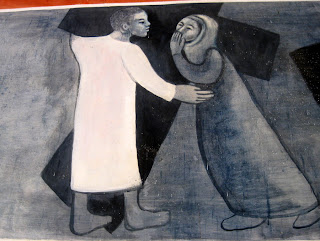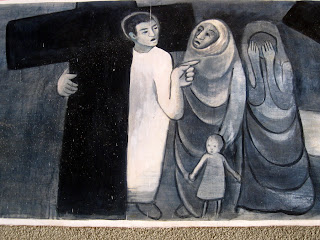There are difficulties of various kinds in coming to live and work here. Emotionally, for me one of the hardest things is the occasional begging.
Luckily, Diane and I live in a part of Tanzania that does not see a lot of
wazungu, and those who are around are, for the most part, residents like us.
My impression is that places that get a lot of foreign tourists have a lot more begging than our sleepy town. When you are a visitor, it's easier to just give a little money when asked, whether out of compassion or guilt or the desire to get rid of the person. You are merely passing through and you don't have to face the consequences of how you respond, at least not in a direct personal way. Out of sight, out of mind.
For those of us who live in places like this, it's different. The local people are never out of mind. They are our neighbors, students, colleagues, fellow parishioners, shopkeepers, etc. I have least a general concern for their well-being as well as a specific concern for particular individuals. I also have a concern for my
own well-being, namely, I don't want to be constantly approached for a hand-out or a "loan", nor do I want to set up such expectations for other
wazungu who live here or who are going to.
The upshot is that I grapple with how to respond appropriately in a way that is respectful and caring of everyone involved. Early on, Diane and I took the approach of never giving money to Tanzanians who beg or "ask for help". We did not want to set a precedent, nor did we want to encourage a culture of dependency. We have been very good about sticking to this, which also applies to gifts other than money. In Swahili there is a way to refuse that is polite; that response is almost always enough, with nothing further said.
So why does it feel like an on-going struggle? I began this post by writing that begging is a emotionally difficult thing to deal with. As soon as we arrived in Mtwara an expat who has been here for years told us, "there's no shame in begging". That comment has really stuck with me.
A couple of years ago in the New York Times there was an article about the increased use of food stamps during this recession in the U.S. A single mother was profiled who said that she had to "swallow her pride" to apply for aid. In our individualistic American culture the ideal is that of self-sufficiency: adults work and support themselves and their families. If you're not doing this, what's wrong with you? It feels like a personal failure. So help is asked for reluctantly and then at a very high psychological cost because it is an admission of failing to measure up.
But that's also why it is so hard for us to
refuse when asked. The requester has put their self-image on the line — to say no is to dish out yet another blow. Do I like to be so hardhearted?
My conclusion is that among Tanzanians there is an entirely different social and psychological landscape around begging. A complete stranger may approach and ask me to "help him". People we barely know may do likewise. Kids may ask for candy, a ball, or small amounts of money. It all feels rather offhand and casual. It's as though there's not much psychological cost expended, so it's no big deal to ask. And it's no big deal to be refused.
I would not go so far as to say that they have no shame, but rather that shame results from other kinds of circumstances. Being materially lacking so as to need help is not one of them. That's perhaps consistent with African societies being traditionally much more collectively structured and less individualistic. It is just a
different kind of survival strategy for a community to have a high degree of mutual dependence and to have a lot of sharing of resources. (By contrast, I'm recalling the line by Robert Frost, "good fences make good neighbors".)
And in Swahili there are proverbs that say that wealth and good things only come from God. They imply that if your situation is good, you can't take much credit for it. Furthermore, if you have been graced by God, then you should share the bounty because it is a gift anyway. There's wisdom in such a perspective.
I do embrace that perspective, but there are other attitudes that also inform my deeply ingrained emotional responses. -Earl


















































